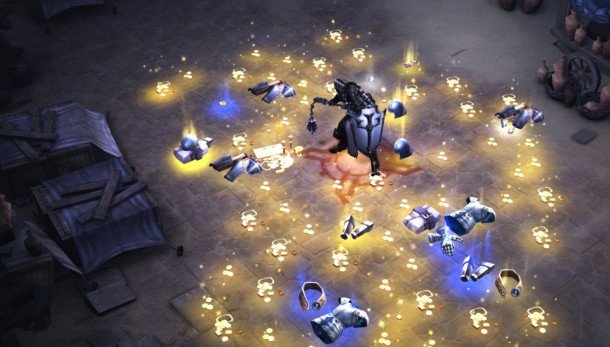Diablo 3's lead producer talks patch 2.0, community feedback and balancing the game

Diablo 3 has occupied a substantial amount of my gaming time over the last couple of weeks. The loot 2.0 patch made all the difference, overhauling drop rates, item distribution and game difficulty in anticipation of the closure of the auction house. I liked the game on release but fell out of love with it due to well-documented problems with its endgame and economy. Now that they're gone, the game feels fresher than it has since launch.
Lead producer Alex Mayberry agrees. "It opens up the design for us, as well as the players" he says. "We have more options in our toolbox to design with. With Reaper of Souls, our designers are now looking towards the future and what more they can do with the game - having a new, open approach."
The patch has been broadly well-received, even among the Diablo hardcore. This has been reassuring for a team that were tasked with turning a troubled game around. "It's been a great validation of what we're doing with Reaper of Souls" Mayberry says. "As good as 2.0 is, it's a precursor to what's coming."
This sense of validation suggests that the development team have internalised the types of feedback they've been getting since Diablo 3's release. The ambitious original plan for the auction house was an experiment on Blizzard's part that was summarily rejected - and proven not to work - by the community. There's a danger implicit to its removal that Blizzard might be reluctant to tinker with the formula in the future, for better or worse.
I asked Mayberry whether Reaper of Souls' adventure mode - which remixes content to provide a more varied but less directed endgame - represented a further concession to the way Diablo 3 was consumed by its community. He argues instead that it represents increased confidence, on the designers' part, in how much freedom they have to alter the game at a fundamental level.
"One of the struggles [with Diablo 3] has been maintaining the legacy of the previous games" he explains. "It's a hard balance to strike, because the original difficulty levels combined with replaying the story modes was a convention created by Diablo and Diablo 2. In today's age, that felt constraining. With Reaper we felt like we should change this, and open up the game."
As players have rushed to figure out how to make the most of patch 2.0 and the new loot system, I've noticed threads cropping up complaining about profitable runs being nerfed - and, in some cases, exploits being shut down to the detriment of player enjoyment. I asked Alex if the team felt they could ease off on this kind of balancing now that the auction house isn't a concern.
The biggest gaming news, reviews and hardware deals
Keep up to date with the most important stories and the best deals, as picked by the PC Gamer team.
"It's not just about the auction house" he says. "We want the game to be viable in its entirety. [Sometimes] we'll have routes that become so efficient that they negate the rest of the game - those are the things we look out for. Players will often take the path of least resistance, and they'll take advantage of it."
Specifically, Blizzard look for "an inordinate amount of players repeating the same activity over and over again in a single location." This behaviour, Mayberry explains, devalues the effort that has been made to create varied tilesets, enemies, and so on. His explanation might not salve the frustration of players who feel like they're being deprived of legendary item drops, but it does provide a benign counterpoint to the argument that Blizzard are tinkering with the random number generator just for the sake of it.
For the Diablo 3 team, Reaper of Souls is about getting the game into a position where it can be expanded fruitfully in the future - but the next few months are crucial for determining what that future looks like. It'll be players, ultimately, who determine the exact duration of Diablo 3's new lease of life.
Joining in 2011, Chris made his start with PC Gamer turning beautiful trees into magazines, first as a writer and later as deputy editor. Once PCG's reluctant MMO champion , his discovery of Dota 2 in 2012 led him to much darker, stranger places. In 2015, Chris became the editor of PC Gamer Pro, overseeing our online coverage of competitive gaming and esports. He left in 2017, and can be now found making games and recording the Crate & Crowbar podcast.


